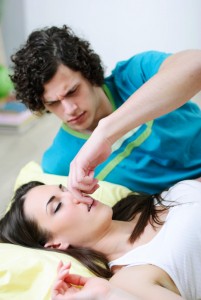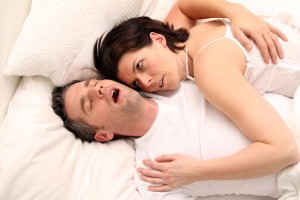 Sleep apnea is the cessation of breathing during sleep for at least 10 seconds at a time. There are two types of sleep apnea: central and obstructive. Central sleep apnea (CSA) is a disorder that causes the brain to stop sending the proper signals to the muscles that control breathing. The most common form of sleep apnea is obstructive sleep apnea (OSA). This form of apnea occurs when airways are blocked during sleep causing the cessation of breathing. Many patients are treated using Continuous Positive Airway Pressure (CPAP) that, as the name suggests, keeps airways open using a continual flow of air. Many CPAP users are unhappy with the system because the sounds it makes are loud, they can’t get used to the sensation of forced air, and because the CPAP system is inconvenient for travel. For patients who suffer from OSA, our Beachwood, OH dental team has an alternative to the CPAP system: oral appliance therapy with The Moses® and SomnoDent®.
Sleep apnea is the cessation of breathing during sleep for at least 10 seconds at a time. There are two types of sleep apnea: central and obstructive. Central sleep apnea (CSA) is a disorder that causes the brain to stop sending the proper signals to the muscles that control breathing. The most common form of sleep apnea is obstructive sleep apnea (OSA). This form of apnea occurs when airways are blocked during sleep causing the cessation of breathing. Many patients are treated using Continuous Positive Airway Pressure (CPAP) that, as the name suggests, keeps airways open using a continual flow of air. Many CPAP users are unhappy with the system because the sounds it makes are loud, they can’t get used to the sensation of forced air, and because the CPAP system is inconvenient for travel. For patients who suffer from OSA, our Beachwood, OH dental team has an alternative to the CPAP system: oral appliance therapy with The Moses® and SomnoDent®.
(more…)
Category: sleep apnea test
The Alternative Sleep Apnea Treatment Beachwood Residents Prefer
November 18, 2015
Sleep Apnea Treatment for Patients in the Cleveland Area
June 27, 2011
 If you snore at night or suffer from symptoms like irritability, difficulty concentrating, morning headaches, or daytime drowsiness, you may have sleep apnea.
If you snore at night or suffer from symptoms like irritability, difficulty concentrating, morning headaches, or daytime drowsiness, you may have sleep apnea.
An under-diagnosed condition, sleep apnea can disrupt your (and your partner’s) sleep and have a detrimental effect on your overall health, putting you at risk for a wide spectrum of serious conditions ranging from heart attack to stroke, high blood pressure, heartburn, depression, and even memory loss.
If you snore, you may have occult sleep apnea.
March 4, 2010
If you snore, your bed partner may not be the only one who doesn’t have the benefit of restful sleep. You may not be getting enough oxygen to meet your body’s needs. One of the ways to measure the effectiveness of your sleep if you snore is to do an at-home sleep test. The process starts with an evaluation in our office. Dr. Hornstein will check your mouth and airway and all the necessary information will be gathered before the test. This info will be sent to Sleep Optima, the company that provides the equipment and processes the insurance claims. (You can get more information at www.mysleeptest.com.) They will send the equipment right to your house with specific instructions about how to administer the test. The test equipment consists of a headband that contains sensors that collect the needed information. This info is interpreted by the microprocessor in the device. It also has a nasal cannula that you wear in your nose (similar to how oxygen is delivered) that measures airflow and oxygen levels. In addition to respiratory breathing rhythms, the sensors also detect sleep positions, stages of sleep, blood oxygen saturation, pulse rate, and snoring loudness. After using the equipment for two nights, you then return the device back to Sleep Optima. It takes about 7-10 days for the results of the tests to be available.
Sometimes people who snore may not look like they stop breathing, but will have periods of low oxygen levels. This is called occult sleep apnea or hidden times of low O2 levels (also know as hypoxia). Since even occult apnea can lead to an increased risk of high blood pressure, stroke, heart attack and other problems, it is important to rule out sleep apnea in people who snore. If you or a loved one snores, you should consider doing a home sleep test.
It just might save a life!
